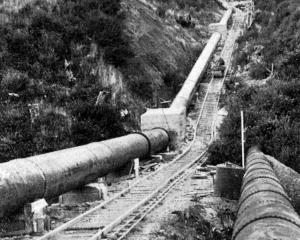
The chairman of the Vincent County Council (Mr Shepard) was among those present, also Crs Ritchie, Polson, and McCarthy, the last-named gentleman presiding over the meeting.
Some discussion took place as to whether a branch of the Farmers' Union should be formed, the councillors present and Messrs Faulks (Pembroke), Urquhart (Hawea), Scaife (Pisa), R. K. Smith (Tarras), J. Kane, sen. (Luggate), and K. Munro (Tarras) being among the principal speakers.
It was eventually decided that a league representative of the residents of the Upper Clutha be formed to advance the interests of the district in every way possible by united action.
It was further resolved that those present should arrange that meetings for the election of delegates be held in the different centres, and that the first meeting of delegates appointed be held at Cromwell on August 1.
• The inventor of the famous rifle now used by the German infantry has died at Oberndorf, on the Neckar, at the age of 75.
He was the son of an Oberndorf gunsmith, and when 12 years of age he started experimenting in his father's workshop. He was apprenticed in 1859 to an arsenal company at Ludwigsburg, where he became interested in the breech-loader.
Mauser devised a breech-loader with self-cocking action in which the spring was regulated by the opening and shutting of the breech, and the percussion effected by a bolt instead of by a needle. Metal cartridges were also introduced.
However, shortly before he produced his rifle the Wurtemberg army had adopted a new weapon. Nor would Prussia at first accept his invention.
In consequence of financial straits he had to give up, after two years' work, his factory at Liege, which he had established in 1867.
He returned home to Oberndorf, and worked till he produced a more perfect model, the famous ''Mauser 71'', which was adopted by the German Army in 1871.
A private company was founded, and success was achieved. Orders came from all parts of the world, and improved models followed in rapid succession - the repeating rifle 71-84, which was invented in 1880 and introduced into the army in 1884; model M. 88, and the infantry rifle 98, which is now used, the most perfect of German small arms, with its improved sighting arrangement and its protection against dirt.
The firm is reputed to have delivered some eight million weapons to customers in all parts of the world, who included, as will be remembered, the Transvaal and the Orange Free State. From 1898 to 1903 Dr Mauser was a member of the Reichstag. His favourite occupation was singing.
• Four men have been rescued by the United States revenue cutter Seneca after being adrift for a fortnight in an open boat, by which they escaped from the blazing steamship Columbian, burned at sea on May 3.
They were landed at Halifax, Nova Scotia. They alone of the 15 men who took to one of the lifeboats of the Columbian had survived the 14 days' exposure. Eleven of their companions died in the boat from hunger, thirst, and exposure.
Two or three of them died from hunger and exposure alone, but the majority drank salt water, which drove them insane, and one of the last to expire was a giant Russian fireman, who tried to murder his companions then living, and was only overpowered after a desperate struggle.
- ODT, 14.7.1914.












